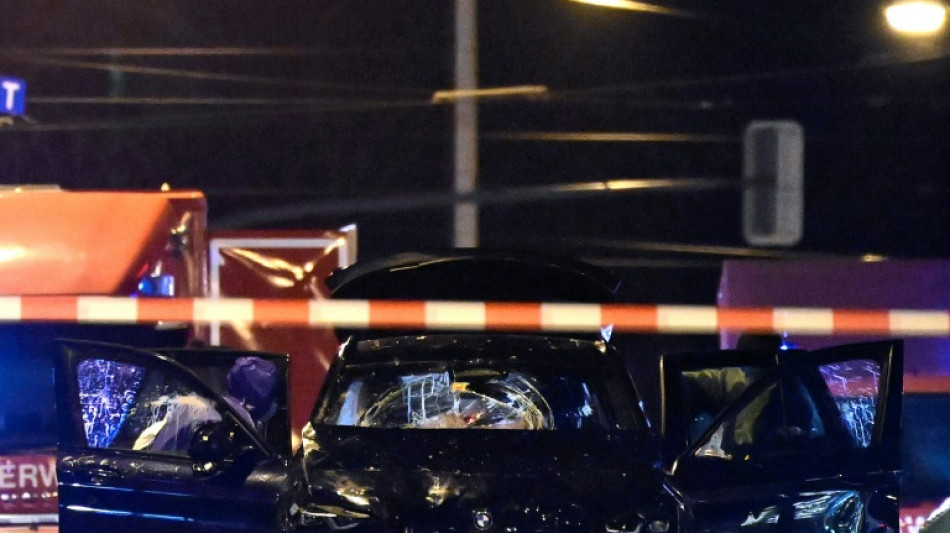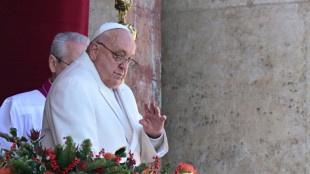
| RBGPF | -1.17% | 59.8 | $ | |
| CMSD | -0.41% | 23.3799 | $ | |
| RYCEF | -0.69% | 7.2 | $ | |
| VOD | 0.12% | 8.43 | $ | |
| CMSC | -0.55% | 23.53 | $ | |
| NGG | 0.49% | 59.21 | $ | |
| SCS | 0.21% | 11.925 | $ | |
| BCC | -2.14% | 120.36 | $ | |
| RIO | -0.55% | 58.925 | $ | |
| GSK | -0.43% | 33.974 | $ | |
| RELX | -0.79% | 45.5 | $ | |
| AZN | -0.71% | 66.05 | $ | |
| BTI | -0.32% | 36.315 | $ | |
| BCE | -1.08% | 22.625 | $ | |
| JRI | -0.83% | 12.1 | $ | |
| BP | 0.45% | 28.98 | $ |

Germany in shock after new deadly Christmas market attack
Germany reeled Saturday from the shock of a new deadly attack on a crowded Christmas market where Chancellor Olaf Scholz was to visit the scene of the carnage.
Police arrested a 50-year-old Saudi doctor at the scene after two people were killed and 68 injured when an SUV ploughed through the festive crowd in Magdeburg on Friday night.
Residents went to the Johanneskirche church, just opposite the market, on Saturday to lay candles in tribute to the victims.
Police said it was not possible to immediately say whether the attack was inspired by radical religious or political beliefs, or linked to psychological problems. The detained suspect has voiced anti-Islam views on social media.
The Saudi man, named by German media as Taleb A., was a psychiatric doctor who had lived in Germany since 2006 and held a permanent residence permit.
Media pointed to his social media posts in which he expressed views critical of Islam, sympathetic to the far right and even warned of the "dangers" of an Islamisation of Germany.
"The motives remain mysterious," wrote Der Spiegel weekly about the latest vehicle-ramming attack to target a traditional German festival market.
The black BMW tore through the traditional market in the centre of Magdeburg, southwest of Berlin on Friday night.
Police said the vehicle drove "at least 400 metres across the Christmas market" leaving behind destruction, debris and broken glass on the city's central town hall square.
The attack came almost eight years to the day after Tunisian man drove a truck through a Berlin Christmas market, killing 13 people. It was the country's most deadly Jihadist attack.
The sorrow and anger sparked by the latest attack, where one of those killed was a child, seemed set to inflame a heated debate on immigration and security as Germany heads for February 23 elections.
One woman told Die Welt daily: "I don't know what world we're living in, where someone would use such a peaceful event to spread terror."
The leader of the far-right Alternative for Germany (AfD), Alice Weidel, which has focused on jihadist attacks in its campaign against immigrants, wrote on X: "When will this madness stop?"
- 'Terrible deed' -
President Frank-Walter Steinmeier wrote that "the anticipation of a peaceful Christmas was suddenly interrupted" but cautioned that "the background to the terrible deed has yet been clarified".
"What happened today affects a lot of people. It affects us a lot," Fael Kelion, a 27-year-old Cameroonian living in the city, told AFP.
"I think that since (the suspect) is a foreigner, the population will be unhappy, less welcoming," he said.
Michael Raarig, 67 an engineer, expressed his sorrow at the site, telling AFP that "I am sad, I am shocked. I never would have believed this could happen, here in an east German provincial town."
He added that he believed the attack "will play into the hands of the AfD" which has had its strongest support in the formerly communist eastern Germany.
Scholz and Interior Minister Nancy Faeser will on Saturday visit the market, where well-wishers had already left flowers of condolences.
Several European governments expressed shock over the attack. The Saudi government highlighted its "solidarity with the German people and the families of the victims", in a statement on social media platform X, and "affirmed its rejection of violence".
- Series of attacks -
Faeser had recently called for vigilance at Christmas markets, although she said that authorities had not received any specific threats.
Domestic security service the Office for the Protection of the Constitution had warned it considers Christmas markets an "ideologically suitable target for Islamist-motivated people".
Germany has in recent tim seen a series of suspected Islamist knife and other violent attacks which have inflamed public opinion.
Three people were killed and eight wounded in a stabbing spree at a street festival in the western city of Solingen in August.
Police arrested a Syrian suspect over the attack that was claimed by IS.
In June, a policeman was killed in a knife attack in Mannheim. An Afghan national was detained.
The government this year imposed new border controls with European neighbours and pledged to step up deportations of rejected asylum-seekers.
Germany's conservative opposition leader Friedrich Merz, who is ahead in pre-election opinion polls, has pledged in his campaign to show "zero tolerance" on crime and "stop illegal migration".
F.Aiello--LDdC



